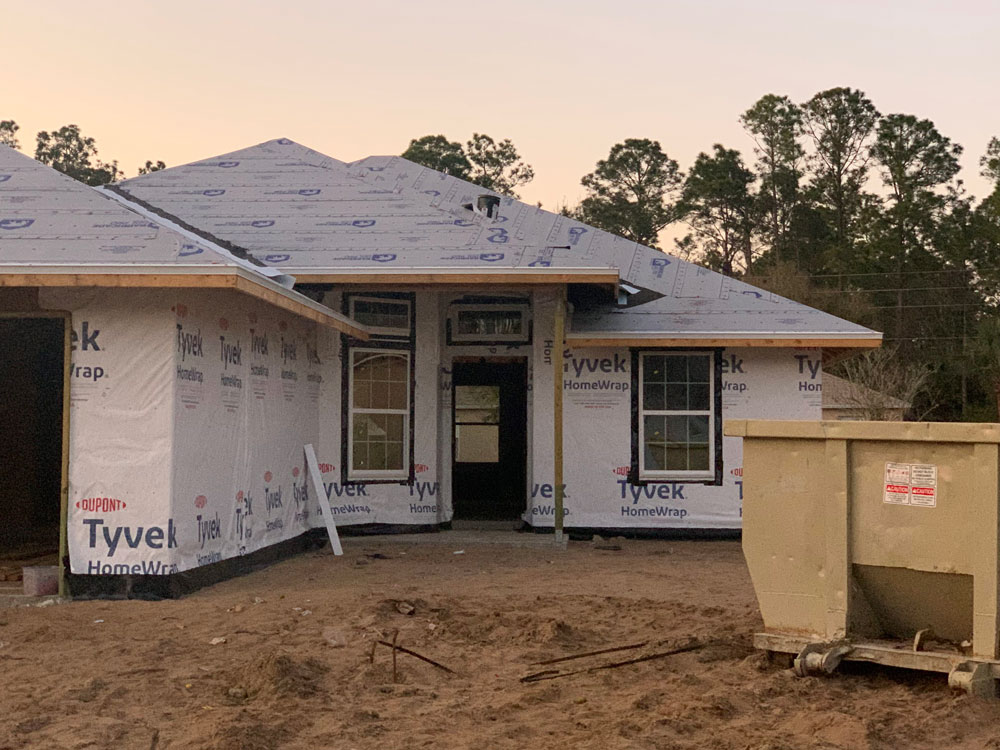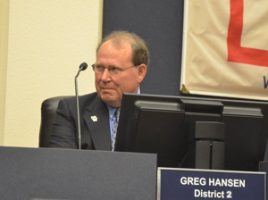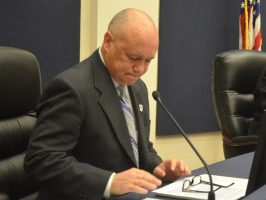
The Flagler County Commission late Monday night voted 5-0 to approve the first increase in school impact fees in 17 years, ending a seven-month confrontation between the commission and the school board as the commission refused to approve the board’s initial request for an increase and further pushed for exact concessions favoring home builders the school board was not willing to make. The new fees start in September.
The unanimous vote is deceptive. With the exception of Commissioner Andy Dance, who crafted the winning motion, all other commissioners voted for the measure kicking and screaming. They did so only after some of them, particularly those running for reelection (Joe Mullins and Greg Hansen) may have been spooked by total public opposition composed of an unprecedented combination of the county’s right and left-wing voices. Even two candidates running against each other for a school board seat joined voices on this one.
The vote took place near 11 p.m., at the end of a six-hour meeting, the last two and a half hours devoted to the impact fee issue. It followed a failed attempt by Commissioners Donald O’Brien and Dave Sullivan to further scale back the School Board’s request in what would have denied it an immediate increase of more than 12.5 percent, the remaining 37.5 percent increasing incrementally over the next three years.
The hearing featured a sharp and obvious divide: residents of all stripes on one side, favoring the increase, and the Home Builders Association on the other. Commissioners were for the most part doing the builder’s bidding, as they had since August, obstructing behind the guise of negotiations. The builders pressed for an increase only conditioned on a further concession. Builders don’t want to pay the impact fee when a development is approved, but only when construction begins. That’s what normally happens anyway–except when the district’s schools are at capacity, when more urgent circumstances require swifter payments. The district has declared itself at capacity. So payments must happen up front, enabling the district to better plan for new school construction.
Eliminating that provision was not part of the measure before commissioners. Dance said it should not be, because it clouded the issue. Commissioners, especially Mullins, muscled that condition into the discussion and looked for ways to muscle it into the vote. But Dance, for 12 years a school board member and the commission’s most seasoned elected official, displayed the kind of parliamentary deftness that effectively disarmed fellow-commissioners. He also gave them a face-saving way out of the box they’d placed themselves in, since it was clear by night’s end that they could no longer derail the impact fee increase. Dance added a clause in his motion that would require the school district and the county to continue negotiating over the timing of impact fee payments (what’s technically referred to as “mitigation credits.”)

More substantially in the short run, the school board got far less than the original impact fee increase it was seeking.
Impact fees are the one-time levy on new construction. Impact fees are designed to defray the cost of the “impact” of new development: as more homes and businesses are built, more services are needed, whether it’s fire houses, roads, parks or schools. Local impact fees are imposed to fund all those. School impact fees apply only to residential construction, since businesses don’t send children to school.
The School Board hasn’t raised its impact fees since 2005 because the housing crash the following year stopped development cold and school enrollment since the middle of the last decade has been remarkably flat. Superintendent Cathy Mittelstadt, who spent many years as a top administrator in the St. Johns district overseeing rapid development there, says the flat years are over. Basing her assessment on a $30,000 impact fee study the district commissioned (as it is required to, ahead of an impact fee increase), the superintendent argued to the commission that population increases are ahead, and that the district is currently at capacity. An addition to Matanzas High School first up in new construction, with a new high school and a new middle school planned for later this decade. (Mullins repeatedly bemoaned the fact that the School Board had not increased impact fees in 17 years, criticizing that as irresponsible. Mullins even Monday evening was not understanding that with no enrollment increases, the district had no justification to increase the fee.)
When the Flagler School Board approved the impact fee for the first time in its history in 2005, it did so after scaling it back from what originally would have been a fee of over $5,000. Builders battled the board then, as did the commission, and won a major concession. The same scenario played out after August this time around. The current school board impact fee is $3,600 for all single-family homes. (In St. Johns County, the school impact fee ranges from just under $3,000 for homes between 800 and 1,250 square feet, to just under $8,000 for homes of 5,000 square feet or more. See St. Johns’s full schedule here.) When the School Board approved its new fee schedule in August based on the study’s recommendation, it sought a single-family fee of $7,175, an increase of $3,575. Fees on apartment units and mobile homes would also increase.
The School Board declared that “extraordinary circumstances” were in play. The phrase (and the declaration) was necessary under a new law that restricts any impact fee increase to 50 percent or less in any four-year period, absent “extraordinary circumstances.”
Builders howled. They had a point: while development in the county has been brisk, school enrollment remains flat. District officials say it’s beginning to increase. But those numbers haven’t yet shown up in official enrollment numbers reported to the state, and what numbers are on the books don’t reflect “extraordinary circumstances,” especially with two mitigating measures the district has taken: it’s moving sixth graders to middle schools starting next school year, and it’s building that addition at Matanzas.
Even though school boards are independent political entities, a quirk in Florida law places the County Commission as the ratifying agent regarding school board impact fees. In other words, the commission acts as gatekeeper, with the power to approve or deny a school board’s increases. That’s what the county did in this case. It rejected the board’s August pitch for a doubling in impact fees and asked for further negotiations.
The School Board did that, and returned with a new proposal: It would scale back the single-family home impact fee considerably, to $5,450. That kind of increase would barely match inflation: in inflation-adjusted dollars, the $3,600 fee imposed in 2005 would have to be $5,230 today. In purchasing dollars, the district was not increasing its fee. It was merely adjusting it for inflation, even though the cost of building schools has outrun inflation.
The district made a further concession. Any additional fee increase would be tied to further school enrollment increases: Each 500-student increase would equate to a $500 increase in the single-family home fee. And it made yet another concession by agreeing to delay the start of the new fees for six months, instead of three.

Hansen’s statement was itself dishonest in light of the school board’s actual negotiations and concessions. The only point on which the school board did not budge was on mitigation credits, which, as Dance stressed, were not part of the commission’s purview in this case. It was, in fact, the County Commission that again and again rejected the School Board’s requests since August. When Hansen blamed the district for insisting on “your way or the highway,” he was describing his commission. (He also made false statements about news reporting on the issue, but that’s nothing new for Hansen or most of his colleagues on the commission, who routinely deflect their own missteps by attacking media or others.)
There was another debate. Commissioner Donald O’Brien asked: could the commission pass the ordinance without a determination of extraordinary circumstances–which would also mean that there would be no incremental increases in impact fees with every 500 additional students–and have the district return in the next year or two or three with a new study that calls for an increase in impact fees at that point? Kristy Gavin, the school board attorney, said that would be possible, but at a cost to the district. The previous study cost $30,000. Another study would cost at least that much.
But there was a disagreement between attorneys. Hadeed said the law precludes that route. It forbids a locality from increasing impact fees more than once every four years unless extraordinary circumstances are in effect. O’Brien disagreed with Hadeed’s reading of the law. He went on to deliver a long disquisition on the need to follow facts, criticizing several members of the public for presenting what he saw as “not factual.” O’Brien then almost immediately reversed course and himself dismissed facts, at least as presented by the school district’s study–the most data-based set of evidence the commission had in hand–to apply his own assumptions.
“Staying with facts,” Dance finally asked O’Brien, using O’Brien’s words, “you mentioned that you disagree with the student growth projections. Can you state your substantial, competent evidence to counter that statement? Or is that not a fact-based statement?”

Dance said the study was fact-based. “So if you’re not going to agree with that, what’s your fact based argument?” he asked. “If you’re disagreeing with their calculations and facts. You should have a fact based argument.”
“I disagree with the the assumptions they made about the composition of the future population in-migrating into the count,” O’Brien said.
“Right, but then you should have data that supports the opposite argument. You should have data that says it’s significantly less,” Dance said.
“I disagree with the formula. I could throw any formula up you want,” O’Brien said.
And so it went. It was the latest in a now-routine display of a commission divided not on ideological grounds, but the fact-based realities of one side against the interpretations of another.





























Lin says
Thank you, FlaglerLive, for a comprehensive article.
The BOCC has certainly declared itself an advocate for the Builders.
This is not really a victory for PCers since this increase is first in 17 years and barely covers inflation. $3,500 would have been 1% of a $350,000 house which, in my 25 years of experience as a Real Estate salesperson, would not be a prohibitive factor in a home purchase.
Bailey’s Mom says
A lengthy but needed meeting! It was really nice to see the Citizens of Palm Coast together on this issues as it is about our students and education!
Hoping we can come together in November to vote in qualified candidates for the County Commission that represent the best interest of the citizens and the county.
This meeting was a glaring example of the ineptness and self serving individuals currently on the Board.
Andy Dance finally had his say and showed why he should be on the Board. Time for all the others to be Voted OUT!
Gina Weiss says
Education for our children’s future is one of the most important services that a municipality can provide, I don’t understand this FCBOCC with the exception of Andy Dance, I guess there’s nothing in it for them! Maybe this will also defer some further overdevelopment because we know that they are not on the side of we the citizens who elect them to serve in our best interest. Their arrogance last evening showed their true colors.
Roy Longo says
Thank you Commissioner Dance for discussing facts and always being responsible to do what’s right. As far as Mullins and his unmerry men, you have all proved that facts mean nothing to you. All of you are only interested in grandstanding for votes and nothing else. I seriously hope you are voted out when time comes.
Celia M Pugliese says
Thank you FlaglerLive! Oh my was a long night meeting like I said to them, if I was on their place of elected officials to represent us actually they DON’T, as they had the audacity to place the hot cake Impact Fees item last on a long agenda…maybe with the hopes that we will leave …and some did. At the end also the bias to give developer and PLDRB member Langello 5 more minutes after his 3 were over with, showing among many other actions their siding with special interest developers against the residents pleas.
This is to keep fresh in our memories at the ballot box. Nevertheless I am happy today to learn and watch that thanks to the fierce battle by School Board, residents, parents and Commissioner (and very knowlegeable former School Board Member) Andy Dance a victory was achieved. Thank you to all that united to defend a common cause no matter party affiliation!
Janet Sullivan says
Thank you, Andy Dance. Time and time again you show up– prepared, articulate, and in tune with the community. You are so appreciated.